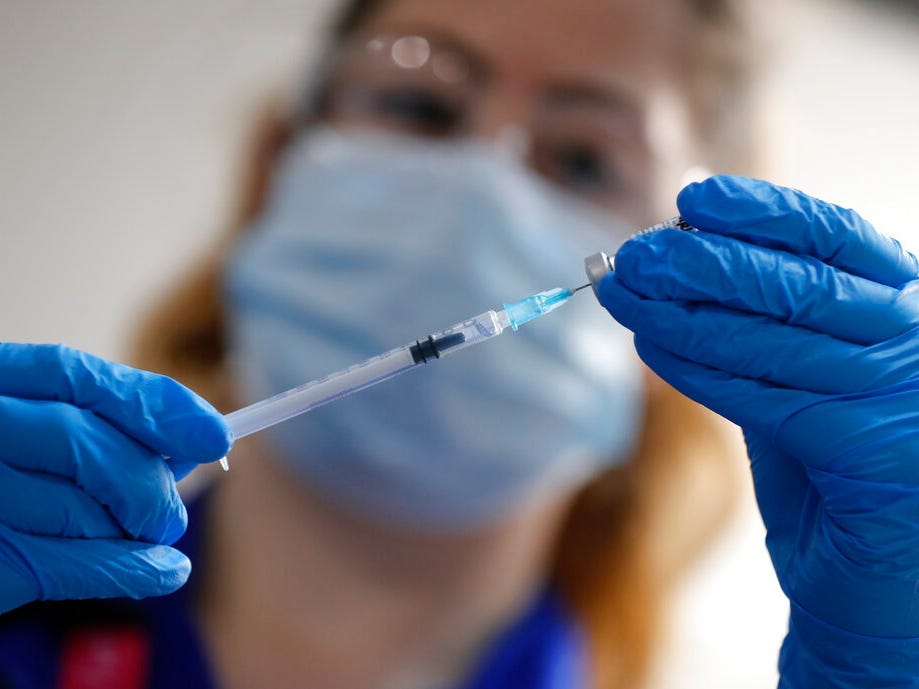
AP Photo/Frank Augstein
- A CDC committee recommended the new Pfizer coronavirus vaccine for people 16 years and older during a meeting Saturday.
- While there’s a lot more to learn, particularly on how the vaccine affects people in certain populations like pregnant and lactating women, and people with autoimmune conditions, the panelists agreed its “desirable consequences clearly outweigh undesirable consequences in most settings.”
- The move will help more people get the vaccine covered by insurance, and aligns the agency with the FDA, which just authorized the vaccine for emergency use Friday night.
- For more stories like this, sign up here for Business Insider’s daily healthcare newsletter.
The Advisory Committee on Immunization Practices, part of the Centers for Disease Control and Prevention, just voted to recommend Pfizer’s coronavirus vaccine for everyone over age 16.
The move further paves the way for the shots to be rolled out in the US, although CDC Director Dr. Robert Redfield still must accept the panel’s recommendation.
It also ensures the vaccines will be covered under the Affordable Care Act and aligns the organization with the US Food and Drug Administration, which authorized the shots for emergency use Friday night. They’re now on their way to states across the country, where they’ll begin being administered later next week.
The Saturday vote including 11 “yes” votes and three abstentions due to conflicts of interest is “only one step, there is much work left to do,” Dr. Nancy Messonnier, director of CDC’s National Center for Immunization and Respiratory Diseases, said during the meeting. “But it’s a hugely important step.”
The committee made recommendations regarding pregnant women and those with severe allergies
During ACIP’s meeting, which was bumped up from its originally scheduled date on Sunday, committee members hashed out their comfort recommending a vaccine with many remaining unknowns, particularly in populations including 16- and 17-year-olds, pregnant and lactating women, and those with allergies and people who are immunocompromised.
They recommended that pregnant and breastfeeding women and immunocompromised people decide for themselves whether or not to get a vaccine while they wait for more data to become available. On Saturday morning, the FDA took a similar stance.
"The provider and the individual can make a decision about whether the benefits outweigh the risks, because certainly COVID-19 in a pregnant woman is not a good thing," Dr. Peter Marks, director of the Center for Biologics Evaluation and Research at the Food and Drug Administration, said during a press conference.
ACIP also said healthcare providers should monitor those with histories of severe allergic reactions for 30 minutes after injecting them. The FDA has said that unless people are allergic to the shot itself or to one of its ingredients, which is extremely rare, they can get the vaccine.
More detailed materials will spell out the CDC's recommendations in the coming days, Messonnier said.
Despite the unknowns in certain populations, ACIP was united in recommending the vaccine, agreeing its "desirable consequences clearly outweigh undesirable consequences in most settings."
Committee member Dr. Beth Bell, director of the CDC's National Center for Emerging and Zoonotic Infectious Diseases, said the process used to come to the decision "is transparent, is science-based, keeps equity in mind, and, for this moment, is the absolute best that we can do."
"I can say quite confidently that, yes I certainly will take this vaccine when I'm able, and I would give it to my family members," she added. "I think the risk-benefit is pretty clear."
The vote makes sure the coronavirus vaccine is covered under the Affordable Care Act
Government officials have been calling for coronavirus vaccines to be free once authorized, passing legislation in March that called for it.
And as part of Operation Warp Speed, the government has ordered hundreds of millions of doses from drugmakers.
But getting the recommendation from the CDC's ACIP is an important step to making sure the vaccine is covered under the Affordable Care Act.
While ACA requires most insurers and employers to fully cover preventive services, including vaccines, not all vaccines are included in this requirement. It's up to ACIP to make that call, which they did today.
"If you are in health coverage that is covered by the Affordable Care Act - and that's a caveat because we know there are lots of people who may be in plans not subject to the ACA, like short-term plans - and a vaccine is recommended by this committee, health plans within 15 days have to cover it and they can't charge you a deductible or coinsurance or copayment for that vaccine," Sabrina Corlette, a Georgetown University research professor and expert on private insurance, previously told Business Insider.
That 15-day-timeline is especially speedy: In the past, health insurers could take up to two years after ACIP recommended a vaccine before they were forced to begin covering it. March's CARES act changed that for COVID-19 vaccines.
AHIP committee member Bell acknowledged that while the committee is recommending the vaccine for those 16 and over, and insurers will now need to swiftly cover it, their vote doesn't mean enough vaccines will be immediately available for everyone who should get one.
"This vaccine and future vaccines do provide a promise of a lot of progression in the future, while of course ... our vaccine supplies are going to be limited for quite some time to come," she said.

